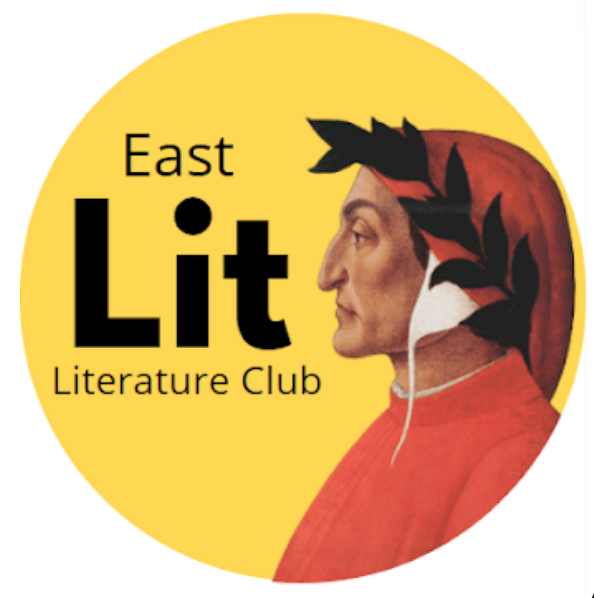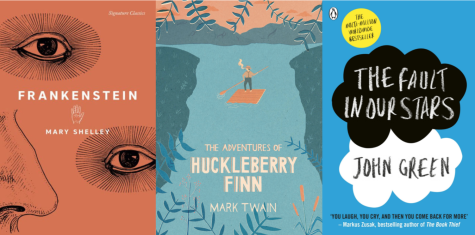East Literature Club Makes Book Recommendations for April

East Literature Club is a club at Cherry Hill East dedicated to people who love reading.
Frankenstein by Mary Shelley – Review by Andrew Aeillo (‘23)
When one hears the word “Frankenstein”, they automatically think of the classic horror movie, but the book it’s based on is even more of an adventure. Mary Shelley’s Frankenstein, arguably the first science fiction novel, explores the elements of innocence and human nature. The novel begins with a young Dr. Frankenstein going away from Switzerland to the University of Ingolstadt in Germany. As he studies and eventually earns his doctorate, he begins an experiment. Frankenstein starts to collect human cadavers, attempting to reanimate and recreate a human being. One day, Frankenstein comes home and sees his experiment sitting up, looking at him. Frightened, Frankenstein locks the door and comes back later to find the monster gone! (Spoiler ahead).
One day Frankenstein, receives a letter from his father, stating that his little brother William was murdered in the woods. Frankenstein returns and sees the monster from a distance, blaming him for the murder. After William’s funeral, Victor(the doctor), goes for a hike in the alps. In the alps, Victor encounters the monster and spends a quarter of the book listening to the monster’s life story. Victor learns that the monster traveled through the Alps, learning of human society. The monster spent a good time observing a family of siblings and their blind father, where he learned to speak. However, like everyone else he meets, the monster is viewed as horrible based on his looks. The monster asks Victor to create a female company to keep him happy, threatening more vengeance if he fails. Victor travels to Scotland to create the companion, followed by the monster. Prior, he visited England with his best Clerval and left Scotland, lands in Ireland. In Ireland, Victor finds that the monster murdered Clerval, taking another victim. Victor travels back to Switzerland to marry his cousin(that was normal), Elizabeth. Of course, Elizabeth is murdered, also leading to the death of Victor’s father. Victor vows to kill the monster, following him all the way to Siberia. Unfortunately, the novel ends with Victor dying of exhaust on a rescue ship, relieving the monster of any vengeance. The monster killed those close to Frankenstein because he felt anger towards his creator since the monster has been treated as an abomination.
Some may find Frankenstein rather boring, and I don’t blame them, but Frankenstein is well-written with events that jump out at you. To sum it all up, Frankenstein teaches you to be careful with what you desire and to not judge a book by its cover, because you could face dire consequences.

The Adventures of Huckleberry Finn – Review by Derrin Lerner (‘23)
Many realistic fiction texts blur my immersion at a disconnect from the characters and connection to history. Mark Twain’s The Adventures of Huckleberry Finn manages to keep a steady flow, much like the Mississippi River, carrying Huckleberry Finn downstream throughout the novel.
Without divulging the detail of the novel, something you should experience for yourself, I must give context to the story. Huckleberry Finn, a pre-teen troublemaker, transcendentalist focused more on nature and exploration rather than “sivilized” society, as he would cite. This deliberate ideology is reflective of Twain’s own views on society. By leading Finn to morally questionable characters, one can derive not only entertainment but a commentary on society. Not only does Twain depict the racist hierarchy set before the Civil War, but also pokes at religious hypocrisy and stereotypes. While most kids obviously should have less responsibility than those of age, Huck stays the only character aware of the illogical hate across the south. Also capturing the time period, Twain masters multiple dialects of the south. The main focus of the novel defines the relationship between Huck and Jim, a slave who recently escaped. Huck, influenced by society’s norms, at first distances from Jim, but grows to understand Jim’s value as equally human to himself. Still relevant today, Mark Twain’s commentary makes The Adventures of Huckleberry Finn a worthwhile read.
The Fault in Our Stars – Review by Kelly Chin (‘22)
John Green’s widely appraised novel, The Fault in Our Stars, is a highly emotional, riveting, and intense novel primarily about two teens that struggle with love and health.
I remember first reading this book in sixth grade. Growing up with two older sisters allowed me to mature quicker, so my mother allowed me to read this novel. I fell in love with this book instantly. Within the span of my years at intermediate and middle school, I’ve probably read this book a dozen times. I vividly remember crying every time I read this book, despite knowing what would happen. If this doesn’t convince you to read this powerful and moving story, let me explain more.
Hazel Grace Lancaster is a 17-year-old teenager battling Stage 4 thyroid cancer, causing her to carry around a breathing tank wherever she goes. While attending a cancer support group, a teenage boy named Augustus Waters soon catches her eye, who has lost a leg due to osteosarcoma. They quickly develop a friendship, discussing their favorite movies and books. As Hazel continues to attend the support group, the two become closer and closer.
As the story progresses, the readers become enticed by the two’s relationship. When do they realize their feelings for each other? How will their health complications affect their relationship? This novel is so detail-oriented, it feels as though you are an all-seeing eye in the world of Hazel Grace. The audience becomes so invested in the novel, that you can picture everything in your mind. However, if reading is not your thing, there is a film adaptation of the novel!

